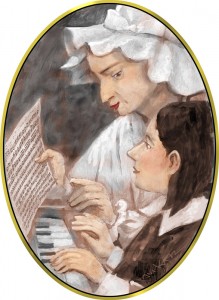I am impressed. You play like a Jew, Felix. What I mean by that is that you have Johann Sebastian Bach in your heart as well as in your fingertips. Please don’t tell your mother I said this. She would be upset to hear that she has not succeeded in bleaching Israel out of you. How mortified she would be if, in the middle of an intellectual evening here in this very parlor, von Humboldt were to apply his magnifying glass to you and say: “Aha! A fine specimen of Mendelssohnius Judaeas!”
 What’s that? Speak up! And please do not call me Aunt Sara. Approximating family relationships is like slurring a gruppetto. I am and will always be your Great Aunt Sara. If you wish, you may, in the grand company that gathers so frequently in this room, be even more precise and refer to me as “Great Aunt Sara Itzig Levy.” And you may add, if asked, “Yes, the daughter of Daniel Itzig and Miriam Wulff, intimates of the illustrious philosopher Moses Mendelssohn, she who studied keyboard with Friedmann Bach, Johann Sebastian’s oldest son, and who has kept the sweet music of the elder Bach alive in her salon through decades of public indifference.” That will do.
What’s that? Speak up! And please do not call me Aunt Sara. Approximating family relationships is like slurring a gruppetto. I am and will always be your Great Aunt Sara. If you wish, you may, in the grand company that gathers so frequently in this room, be even more precise and refer to me as “Great Aunt Sara Itzig Levy.” And you may add, if asked, “Yes, the daughter of Daniel Itzig and Miriam Wulff, intimates of the illustrious philosopher Moses Mendelssohn, she who studied keyboard with Friedmann Bach, Johann Sebastian’s oldest son, and who has kept the sweet music of the elder Bach alive in her salon through decades of public indifference.” That will do.
And wipe that smirk off your face. There is nothing more unattractive than the smirk of a seventeen-year old boy.
Oh yes, at your age you know it all. Music is universal. How can the notes emerging from a pianoforte be Jewish, you ask? Felix, you know nothing at all. Remember that I told you this today, in Berlin, in July 1826, because some years from now you will realize how true it was of you when you were young.
Listen to me. And stop cracking your knuckles. You will ruin your joints. This piece you have played so beautifully for me this morning, the Partita No. 5 in G Major, can only be played properly, in our falscherleuchtung age, this time of false enlightenment, by a person of Jewish sensibility. Please do not interrupt me. At your age you are to listen to your elders first. After you listen you may disagree, you may do whatever you want. But first you must listen.
Sebastian Bach was a devout Lutheran, true, but he wrote Jewish music.
Felix Mendelssohn
Mendelssohn And Monotheism–“Necessary Stories” Column from The Jerusalem Report
 Hazily, I notice that the kid working on his biceps is staring at me, and I suddenly realize that my mouth is hanging open and that my eyes are gaping. He’s in the gym, but I’m having a revelation on the shore of the Red Sea, thanks to the son of a Jewish apostate. Felix Mendelssohn wrote his fourth symphony with Italy in mind, but here, on the stationary bike at the Jerusalem pool, I’ve discovered the truth. It’s not about Rome – it’s about Jerusalem.
Hazily, I notice that the kid working on his biceps is staring at me, and I suddenly realize that my mouth is hanging open and that my eyes are gaping. He’s in the gym, but I’m having a revelation on the shore of the Red Sea, thanks to the son of a Jewish apostate. Felix Mendelssohn wrote his fourth symphony with Italy in mind, but here, on the stationary bike at the Jerusalem pool, I’ve discovered the truth. It’s not about Rome – it’s about Jerusalem.
Revelation seemed distant, even impossible when, just a few minutes ago, I slouched in here like the beast of the apocalypse. At the beginning of May, the elation of liberation from Egypt has long since dissipated. I’m back in my routine – hours in front of the computer, and the usual, unremitting worries about my money, my children, my country, and my planet. From the high roof of Pesah I’ve plunged into the deep pit of the monotonous count of the Omer. The wilderness has literally enveloped Jerusalem on this sweltering, gritty sharav day, the air full of minute dull yellow grains of sand blown up from the vast deserts to the south.
So I was out of sorts when I climbed on the exercise bike for a ride to nowhere. Before me was half an hour that loomed like an eternity to be spent spinning like Ixion on his wheel. No doubt this is how the Children of Israel felt three and a half weeks after the Exodus, trudging through the desert, dusty and thirsty. I am reminded of the midrash that asks why God didn’t give them the Torah immediately after they left Egypt. They were worthy of it, said R. Yitzhak, but they were grimy with mortar and brick-dust. How could they receive the word of God? So they walked and walked and walked and it all looked like the same dreary place.





